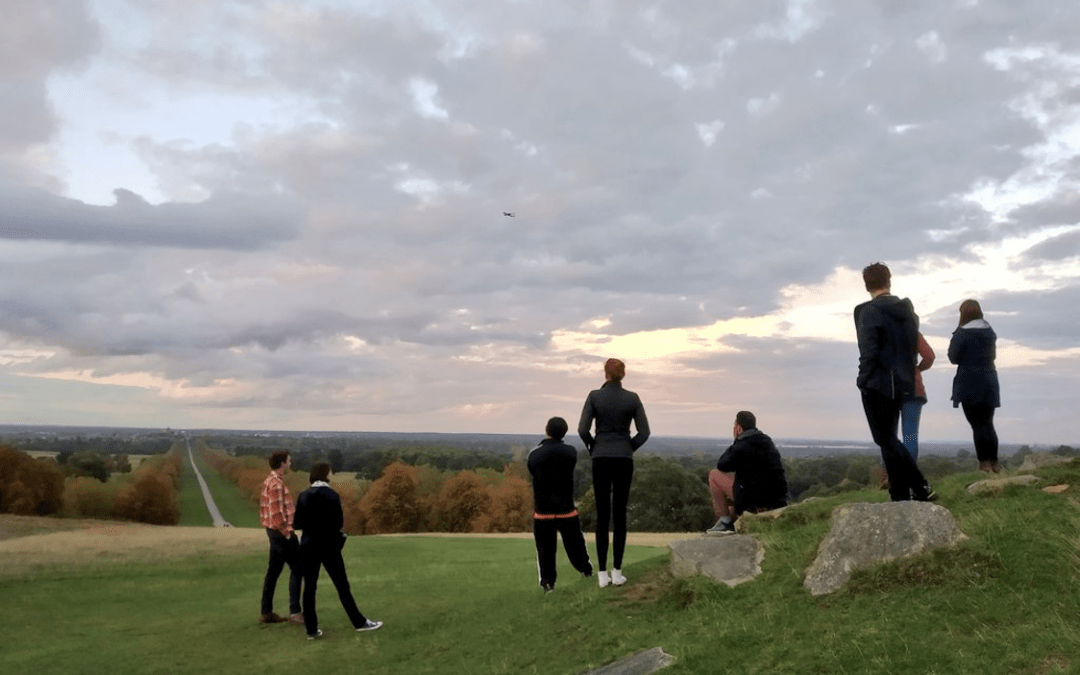Authors: Tom Hardwicke, Georgie Bowyer, Michael Green, Victoria Harbottle, Suzi Gage, Katrina Hope, Joanna Martin. Photo credit: Madara Brice
One crisp autumnal afternoon, beneath a giant statue of King George III straddling a copper horse, a group of researchers were gazing across the expanse of Windsor Great Park, talking earnestly about leadership. For many of us, it was the first time we had ever had such a discussion. Leadership is explicitly valued in business, politics, the military, and the monarchy, but it is rarely mentioned in academia. And yet all of us, PhD students, postdocs, and professors, had found ourselves in situations that required leadership – mentoring students, organizing research collaborations, and running laboratories, to name a few.
Our gathering under the horse was one of many reflective moments during a two-day UKRN/Wellcome Trust Leadership in Academia course. Like the participants, the course organisers had recognized that academic culture, with its myopic focus on productivity (publishing papers) and individual excellence, is seriously neglecting ‘soft skills’ like leadership. Moreover, growing awareness of a transdisciplinary ‘reproducibility crisis’ has led to concerns that academic incentive structures are undermining rather than enhancing research quality. Good leaders have the ability to carve out spaces where colleagues can do their best work and – to paraphrase Richard Feynman – are free to maintain their integrity.
So what is good academic leadership? One of the best qualities of the course was its honest, nuanced, and pluralistic answer to this question: there is no single way to be a good leader, but there are principles of good leadership that we can use to guide our leadership decisions. And although the need to consider leadership is most explicit for those of us in managerial roles or positions of authority, all of us find ourselves in leadership situations where we can contribute to the success of our colleagues. So leadership percolates through all tiers of the academic hierarchy and in all directions, from mentors to students, between peers, and from students to mentors. For example, consider the success of the grass-roots discussion group ReproducibiliTea (https://reproducibilitea.org/) – a student-led initiative to promote discussions about improving science – which has inspired the creation of similar groups at 41 universities in 15 different countries around the world.
Leadership principles can be in tension and how to optimally balance them is rarely obvious. For example, trying to maximise scholarly excellence might lure us into excessive micro-management, undermining team members’ sense of ownership, responsibility, and motivation. Balancing the needs of tasks, individuals, and teams is complex. Continuously over-burdening teams when trying to meet task deadlines may have costs for individual well-being and team morale; conversely, encouraging healthy day-to-day working practices may improve the quality and quantity of research output in the long-run.
The leadership principle of humility suggests that we should reflect on, acknowledge, and accommodate our weaknesses and those of our team. Building a successful team is like doing a jigsaw puzzle – if you pick the pieces that complement each other, the result can be greater than the sum of its parts. The course’s small-group exercises also highlighted that leadership teams may be more effective than solo leaders – peers can learn vicariously from their experiences, complement each others’ skills, and share the burdens of leadership. As a leader, it is important not to neglect your own well-being – put on your own oxygen mask before helping others.
Mentorship is a core aspect of academic leadership, but delivering and receiving feedback is a difficult skill to master. On the course, we learned about radical candor – the best way to positively influence our colleagues’ work and build trust is to provide honest constructive feedback, however negative. Withholding negative feedback or providing disingenuous positive feedback could avoid interpersonal awkwardness in the short term, but may ultimately undermine your credibility and the success of your colleagues. Adopting radical candor in practice may not be straightforward, but it is more likely to succeed if we take the time to get to know individuals in our teams and allow them to get to know us. This builds mutual trust and understanding – radical candor will only be successful if colleagues know you do it because you care.
Leadership is not innate, nor a straightforward skill to master, and there are no simple, one-size-fits-all solutions to the varied leadership challenges we may face. In the bustle of day-to-day academic life, it is easy to be reactive rather than reflective. Over time we may drift from our values and forget that the most important thing is not that next deadline, but our welfare, and that of our colleagues. When we look back on our careers, we can be proud of the teams we have been part of and the contributions we have made to the achievements of our colleagues. Leadership is not a distraction – it is an integral aspect of scholarship. It is time for all of us to reflect on leadership in academia.

